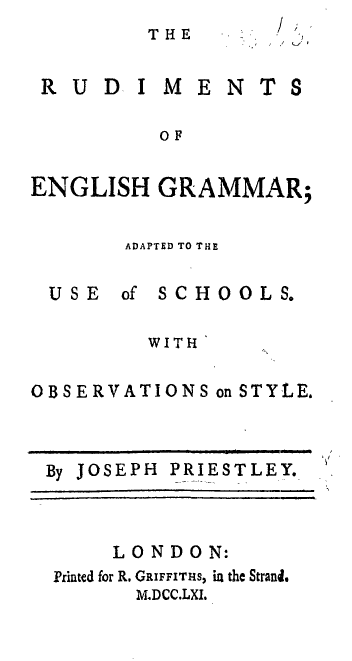The Rudiments of English Grammar on:
[Wikipedia]
[Google]
[Amazon]
 ''The Rudiments of English Grammar'' (1761) was a popular
''The Rudiments of English Grammar'' (1761) was a popular
 ''The Rudiments of English Grammar'' (1761) was a popular
''The Rudiments of English Grammar'' (1761) was a popular English grammar
English grammar is the set of structural rules of the English language. This includes the structure of words, phrases, clauses, sentences, and whole texts.
This article describes a generalized, present-day Standard English – a form of spee ...
textbook written by the 18th-century British polymath
A polymath ( el, πολυμαθής, , "having learned much"; la, homo universalis, "universal human") is an individual whose knowledge spans a substantial number of subjects, known to draw on complex bodies of knowledge to solve specific pro ...
Joseph Priestley
Joseph Priestley (; 24 March 1733 – 6 February 1804) was an English chemist, natural philosopher, separatist theologian, grammarian, multi-subject educator, and liberal political theorist. He published over 150 works, and conducted ...
.
While a minister for a congregation in Nantwich
Nantwich ( ) is a market town and civil parish in the unitary authority of Cheshire East in Cheshire, England. It has among the highest concentrations of listed buildings in England, with notably good examples of Tudor and Georgian architecture. ...
, Cheshire
Cheshire ( ) is a ceremonial and historic county in North West England, bordered by Wales to the west, Merseyside and Greater Manchester to the north, Derbyshire to the east, and Staffordshire and Shropshire to the south. Cheshire's county tow ...
, Priestley established a local school; it was his first successful educational venture. Believing that all students should have a good grasp of English and its grammar
In linguistics, the grammar of a natural language is its set of structural constraints on speakers' or writers' composition of clauses, phrases, and words. The term can also refer to the study of such constraints, a field that includes doma ...
before learning any other language, and dismayed at the quality of the instruction manuals available, Priestley wrote his own textbook: ''The Rudiments of English Grammar'' (1761). The book was very successful—it was reprinted for over fifty years. Its humor may have contributed to its popularity; for example, Priestley illustrated the ''couplet
A couplet is a pair of successive lines of metre in poetry. A couplet usually consists of two successive lines that rhyme and have the same metre. A couplet may be formal (closed) or run-on (open). In a formal (or closed) couplet, each of the ...
'' with this rhyme:
::Beneath this stone my wife doth lie:
::She's now at rest, and so am I.
Priestley also quoted from the most famous English authors, encouraging the middle-class association between reading and pleasure, a reading that would also, Priestley hoped, foster morality. Priestley's innovations in the teaching and description of English grammar, particularly his efforts to dissociate it from Latin grammar, made his textbook revolutionary and have led 20th century scholars to describe him as "one of the great grammarians of his time." ''Rudiments'' influenced all of the major British grammarians of the late 18th century: Robert Lowth
Robert Lowth ( ; 27 November 1710 – 3 November 1787) was a Bishop of the Church of England, Oxford Professor of Poetry and the author of one of the most influential
textbooks of English grammar.
Life
Lowth was born in Hampshire, England, ...
, James Harris, John Horne Tooke
John Horne Tooke (25 June 1736 – 18 March 1812), known as John Horne until 1782 when he added the surname of his friend William Tooke to his own, was an English clergyman, politician, and philologist. Associated with radical proponents of parl ...
and even the American Noah Webster
Noah ''Nukh''; am, ኖህ, ''Noḥ''; ar, نُوح '; grc, Νῶε ''Nôe'' () is the tenth and last of the pre-Flood patriarchs in the traditions of Abrahamic religions. His story appears in the Hebrew Bible ( Book of Genesis, chapters ...
. The resounding success of Priestley's book was one of the reasons that Warrington Academy
Warrington Academy, active as a teaching establishment from 1756 to 1782, was a prominent dissenting academy, that is, a school or college set up by those who dissented from the established Church of England. It was located in Warrington (then ...
offered him a teaching position in 1761.Schofield, 83–5; 99–100; Jackson, 52; Gibbs, 16; Watts, 91.
Notes
Bibliography
*Gibbs, F. W. ''Joseph Priestley: Adventurer in Science and Champion of Truth''. London: Thomas Nelson and Sons, 1965. *Jackson, Joe, ''A World on Fire: A Heretic, An Aristocrat And The Race to Discover Oxygen''. New York: Viking, 2005. . *Schofield, Robert E. ''The Enlightenment of Joseph Priestley: A Study of his Life and Work from 1733 to 1773''. University Park: Pennsylvania State University Press, 1997. . *Watts, R. "Joseph Priestley and education." ''Enlightenment and Dissent'' 2 (1983): 83–100. 1761 books Books by Joseph Priestley English grammar books Style guides {{Grammar-book-stub